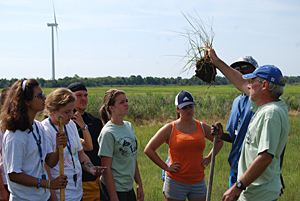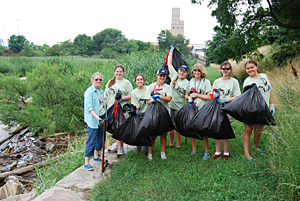
ADVERTISEMENT
- Rozovsky wins prestigious NSF Early Career Award
- UD students meet alumni, experience 'closing bell' at NYSE
- Newark Police seek assistance in identifying suspects in robbery
- Rivlin says bipartisan budget action, stronger budget rules key to reversing debt
- Stink bugs shouldn't pose problem until late summer
- Gao to honor Placido Domingo in Washington performance
- Adopt-A-Highway project keeps Lewes road clean
- WVUD's Radiothon fundraiser runs April 1-10
- W.D. Snodgrass Symposium to honor Pulitzer winner
- New guide helps cancer patients manage symptoms
- UD in the News, March 25, 2011
- For the Record, March 25, 2011
- Public opinion expert discusses world views of U.S. in Global Agenda series
- Congressional delegation, dean laud Center for Community Research and Service program
- Center for Political Communication sets symposium on politics, entertainment
- Students work to raise funds, awareness of domestic violence
- Equestrian team wins regional championship in Western riding
- Markell, Harker stress importance of agriculture to Delaware's economy
- Carol A. Ammon MBA Case Competition winners announced
- Prof presents blood-clotting studies at Gordon Research Conference
- Sexual Assault Awareness Month events, programs announced
- Stay connected with Sea Grant, CEOE e-newsletter
- A message to UD regarding the tragedy in Japan
- More News >>
- March 31-May 14: REP stages Neil Simon's 'The Good Doctor'
- April 2: Newark plans annual 'wine and dine'
- April 5: Expert perspective on U.S. health care
- April 5: Comedian Ace Guillen to visit Scrounge
- April 6, May 4: School of Nursing sponsors research lecture series
- April 6-May 4: Confucius Institute presents Chinese Film Series on Wednesdays
- April 6: IPCC's Pachauri to discuss sustainable development in DENIN Dialogue Series
- April 7: 'WVUDstock' radiothon concert announced
- April 8: English Language Institute presents 'Arts in Translation'
- April 9: Green and Healthy Living Expo planned at The Bob
- April 9: Center for Political Communication to host Onion editor
- April 10: Alumni Easter Egg-stravaganza planned
- April 11: CDS session to focus on visual assistive technologies
- April 12: T.J. Stiles to speak at UDLA annual dinner
- April 15, 16: Annual UD push lawnmower tune-up scheduled
- April 15, 16: Master Players series presents iMusic 4, China Magpie
- April 15, 16: Delaware Symphony, UD chorus to perform Mahler work
- April 18: Former NFL Coach Bill Cowher featured in UD Speaks
- April 21-24: Sesame Street Live brings Elmo and friends to The Bob
- April 30: Save the date for Ag Day 2011 at UD
- April 30: Symposium to consider 'Frontiers at the Chemistry-Biology Interface'
- April 30-May 1: Relay for Life set at Delaware Field House
- May 4: Delaware Membrane Protein Symposium announced
- May 5: Northwestern University's Leon Keer to deliver Kerr lecture
- May 7: Women's volleyball team to host second annual Spring Fling
- Through May 3: SPPA announces speakers for 10th annual lecture series
- Through May 4: Global Agenda sees U.S. through others' eyes; World Bank president to speak
- Through May 4: 'Research on Race, Ethnicity, Culture' topic of series
- Through May 9: Black American Studies announces lecture series
- Through May 11: 'Challenges in Jewish Culture' lecture series announced
- Through May 11: Area Studies research featured in speaker series
- Through June 5: 'Andy Warhol: Behind the Camera' on view in Old College Gallery
- Through July 15: 'Bodyscapes' on view at Mechanical Hall Gallery
- More What's Happening >>
- UD calendar >>
- Middle States evaluation team on campus April 5
- Phipps named HR Liaison of the Quarter
- Senior wins iPad for participating in assessment study
- April 19: Procurement Services schedules information sessions
- UD Bookstore announces spring break hours
- HealthyU Wellness Program encourages employees to 'Step into Spring'
- April 8-29: Faculty roundtable series considers student engagement
- GRE is changing; learn more at April 15 info session
- April 30: UD Evening with Blue Rocks set for employees
- Morris Library to be open 24/7 during final exams
- More Campus FYI >>
3:49 p.m., Aug. 27, 2010----Participating in the cleanup of a Baltimore marsh taught participants in TIDE Camp 2010 a memorable lesson about where human debris can end up when not disposed of properly: the fragile coastal environment.
Short for Taking an Interest in Delaware's Estuary, the University of Delaware College of Earth, Ocean, and Environment's (CEOE) TIDE Camp is a residential program that introduces students to the scientific processes that occur along the coast by offering them lectures and hands-on activities. Seventeen high school students from Delaware, Pennsylvania, Maryland, New York and Massachusetts comprised this year's group and attended the third annual camp, held July 24-Aug. 6.
Taking part in a wetlands restoration project with the National Aquarium in Baltimore, the campers filled more than 20 trash bags with plastic bottles, cups, and any other debris they came across in the marsh adjacent to the Fort McHenry National Monument and Historic Shrine. The experience made an impression on the students, including Tim Alston, a senior from Germantown, Md.
“We didn't get half the trash that was there,” he said. “I learned that you have to be grateful for what we have and not take advantage of this area.”
In addition to providing an appreciation for the coastal environment, the camp showed students what it's like to be a marine scientist and helped them understand the many different academic disciplines that interact during the scientific process.
“A lot of the students begin the program with some understanding of general concepts in marine biology, but they leave with an appreciation for the many other disciplines important to ocean science,” said CEOE Assistant Dean Frank Newton, who organized TIDE Camp jointly with research faculty member Dana Veron.
Over the camp's two weeks -- spent on both UD's Newark campus and its Hugh R. Sharp Campus in Lewes -- more than nine CEOE faculty and staff and eight graduate students worked with the students.
The campers heard lectures about ocean currents and physics, tides and human impacts on the environment. They also built and tested their own underwater research vehicles, toured a Lewes marsh, learned how to take water samples and test for water quality, experienced a bald cypress ecosystem on a kayaking trip, and participated in Delaware Bay larval fish sampling for a CEOE research project.
The group also took advantage of the college's research facilities. They visited the site of UD's 2-megawatt coastal wind turbine, toured the University's 146-foot research vessel Hugh R. Sharp, trawled for ocean critters aboard UD's 30-foot research vessel Donna M., and studied the site of a centuries-old shipwreck using an autonomous underwater vehicle (AUV).
“Our researchers use equipment from buckets and shovels to more sophisticated and expensive equipment like the AUV and the R/V Sharp,” Newton said. “The students saw and experienced it all and in an interactive way that members of the public don't usually get to do.”
Such an up-close experience with marine science proved influential for UD student Emily Baumbach from Hockessin, Del. Baumbach was a rising high school senior when she took part in TIDE 2008, and later applied and came to UD as an environmental science major. She returned to TIDE Camp this year, but this time she served as a camp counselor.
“After my junior year in high school I had no idea what I wanted to do and TIDE got me a lot of hands-on experience,” she said. “It really opened my mind to what's out there in the college and all the environmental issues and marine issues that are going on.”
Her advice for this year's campers?
“If this is what you want to do, UD offers a great program,” she said. “I told them if they're interested in the marine aspects, the biology aspects, even environmental science and studies, definitely pursue it.”
For more information on the college, visit the CEOE website.
Article by Elizabeth Boyle
Photos by Frank Newton



